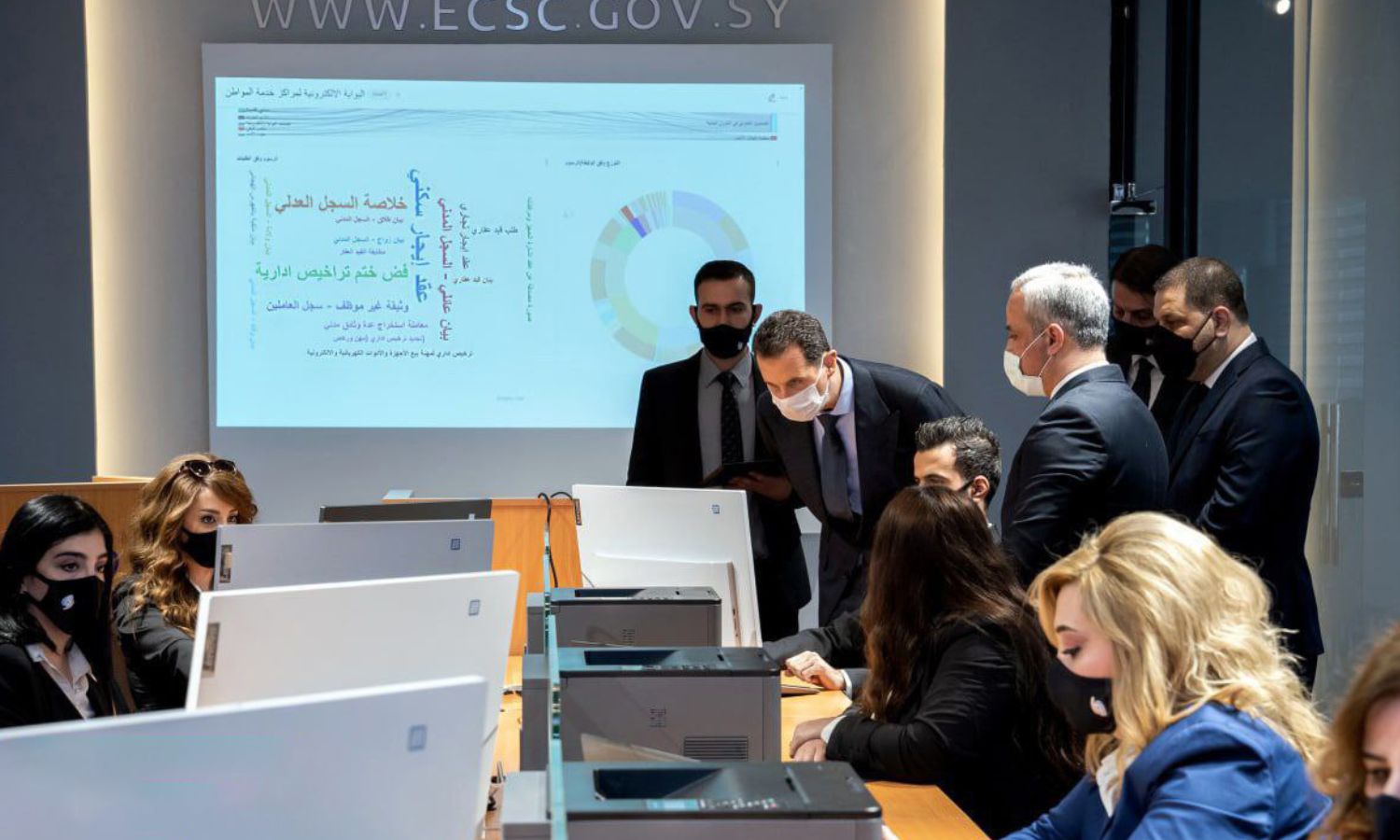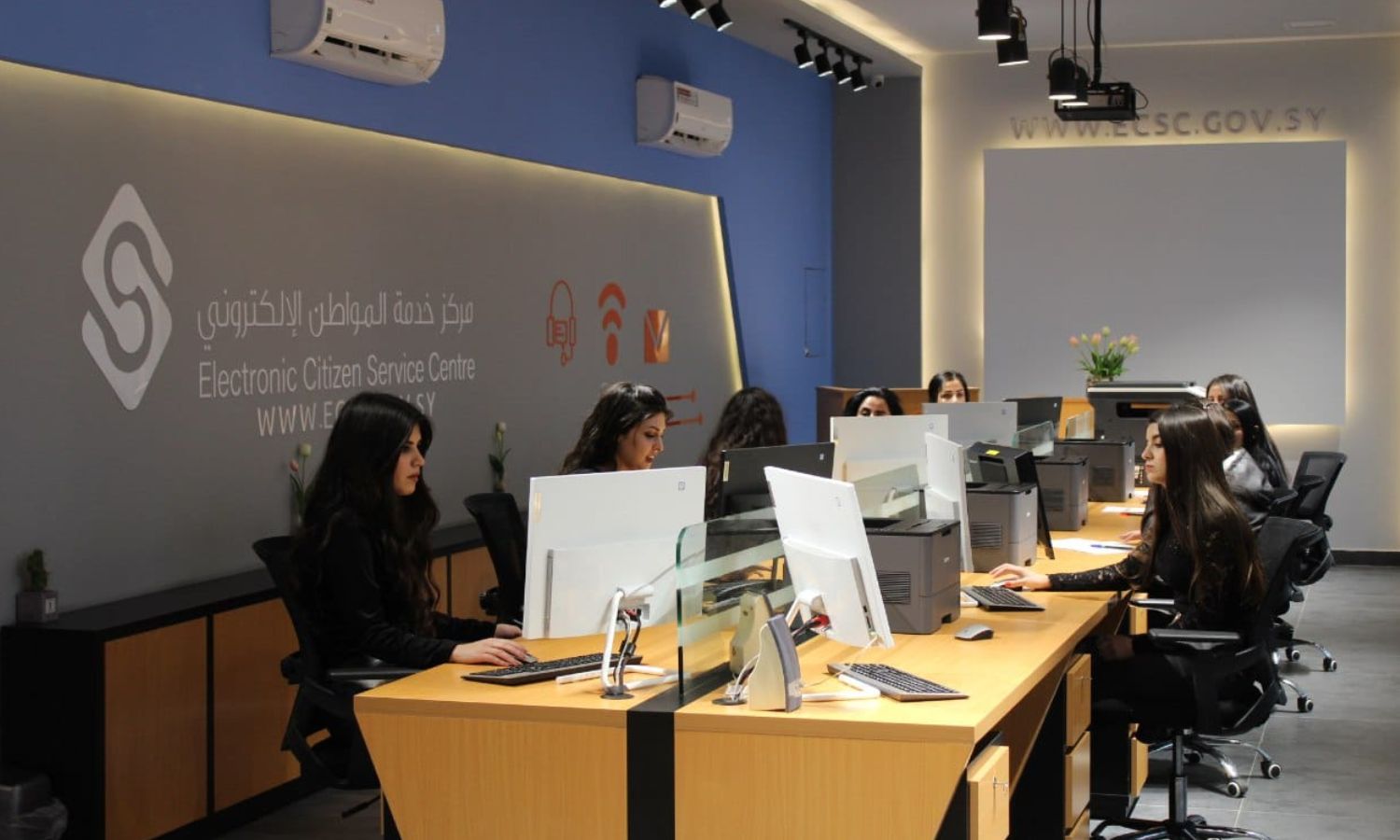



Enab Baladi – Muhammed Fansa
There are frequent announcements by the Syrian regime government about developing its electronic services, in line with the propaganda of the usual “development and modernization process” of the Syrian regime’s president, Bashar al-Assad, but these services often fail in their work for various reasons.
News of seminars and conferences entitled to study the digital transformation of several government institutions is also spreading, while the United Nations e-Government Index proves the decline in Syria’s ranking on the global level.
The Syrian regime’s government began on August 20, issuing biometric passports, which enable airports to upload the holder’s data within minutes “to save time and facilitate procedures,” according to officials, with promises to issue numbers of new passports that will solve the crisis that Syrians are suffering at home and abroad within about a month.
In early October, several tourist offices in Damascus confirmed that some countries and embassies had not yet accepted the Syrian electronic passport.
The owners of these offices explained that Erbil, Dubai, and European countries have not yet accepted the electronic passport, explaining that they do not know when this issue will be resolved, which has caused travel delays for many people.
At the educational sector level, the Syrian regime’s government issued a decision on July 9 stipulating that tuition fees for higher education students at public and private universities and student registration installments at private educational institutions be paid “exclusively” through bank accounts, starting from the current academic year.
The government retracted its decision on September 12, when the Council of Ministers agreed to allow the payment of tuition fees via bank transfers or by direct cash deposit into the university or educational institution’s account, apart from the obligatory electronic method, without explaining the reasons for this retreat.
On September 20, a conference was held at the University of Damascus, in which it was announced the launch of the “Sakan” application for students for electronic registration in the university city via a smart mobile phone. The application comes in cooperation with the Syriatel company by providing registration and fee payment in an electronic way.
The president of the National Union of Syrian Students (NUSS), Dareen Suleiman, stated that the “Sakan” application was launched in all universities except the University of “Aleppo,” and this year, students will begin registering “online” through the application so that the university cities before the universities will transform into “digitalization,” according to her expression.
The director of university housing in Damascus, Abbas Sandouk, confirmed that the electronic application received several complaints and comments from students, as it was “applied for the first time at the university,” according to his justification.
Sandouk added that the main goal of the application is to accommodate the largest number of students so that any student can pay fees from his home without coming to the university and waiting for a long time.
On the other hand, Damascus University students did not find any ease in using the electronic application. Many of them filed a complaint with the university housing administration, and some of them spoke to Enab Baladi about the difficulty of using the application.

An office affiliated with the Electronic Citizen Service Center in Syria – June 2023 (Ministry of Communications and Technology)
In addition to the services offered in the context of electronic transformation, conferences, and seminars are active that address topics that transform specific government sectors into providing their services digitally without specifying a specific time frame for launching these services.
Last September, the Minister of Communications and Technology, Iyad al-Khatib, the Minister of Electricity, Ghassan al-Zamel, and the Governor of the Central Bank of Syria, Mohammad Issam Hazima, discussed the possibilities of facilitating the process of paying electricity bills through the electronic payment system and dispensing with the traditional payment method.
This process, for which no time period has been specified, will allow people to avoid having printed bills. The plan includes notifying subscribers of the issuance or payment of the electricity bill via a text message they receive from one of the two cellular telecommunications companies.
In a similar way, last September, al-Khatib and the Minister of Water Resources, Tamam Muhammad Raad, and Hazima discussed the reality and mechanism of electronic payment at the General Corporation for Drinking Water and Sanitation and the Syrian Telecommunications Company.
The meeting made promises to begin the phase of fully electronic payment for water bills and landline communications bills at the beginning of next year.
Economic researcher at the Syrian Center for Policy Research (SCPR), Rabie Nasr, told Enab Baladi that the main idea for electronic government in Syria is to follow the “fashion of modernization and development” that al-Assad began when he assumed power on the principle of “throwing ashes in the eyes,” by Using technology and information technology according to the “modernization and development” path.
During the first three years after al-Assad assumed power, the idea of “modernization and development” was formed by introducing technology “without developing the system in terms of performance or work mechanism,” according to Nasr, who described this process as “automating backwardness.”
The expert explained that the mechanism required the use of the same employees with the same bureaucratic work mechanism and the addition of computers and networks, which in practice did not reduce administrative burdens or increase production efficiency.
In a 2022 United Nations survey of e-governments, Syria ranked 156th globally out of a total of 193 countries, while in 2020, its ranking reached 131st globally.
The need for digital transformation comes “to prevent corruption and waste, achieve justice and equal opportunities, and make the relationship more transparent between the state and the citizen,” as stated by al-Assad in his constitutional oath speech in 2021, declaring that the next phase of his term is “transparency,” in a country that still tops the list of the least transparent and most corrupt countries.
The use of information technology will lead to reducing corruption, but the basic system of decision-making in Syria is “based on corruption and marginalization,” so electronic tools will not alleviate this structural imbalance, according to researcher Nasr, who worked in the State Planning Authority as chief economist and director of the Macroeconomic Department between 2004 and 2005.
Before 2011, work on the idea of technology and communications had a “formal effect without any substance to facilitate people’s work,” according to Nasr, who said that this system had become “stages worse” over the past decade.
Nasr believes that there are no capabilities in the Syrian infrastructure for government electronic transformation, but if the requirements for such a type of electronic tools are created, it will not meet its purpose because the functional role of government institutions may be “distorted.”
The economic researcher stated that introducing titles such as “smart card” or “electronic services” without giving priority to the weakest people or reducing corruption are merely “untrue buzzwords,” indicating that the regime has no real interest in facilitating the lives of the population or intent on administrative reform.
Among the ideas that are also being proposed in the same context of combating corruption is the idea of administrative reform, which al-Assad spoke about while chairing the government meeting in 2021, saying that the ultimate goal of administrative reform is “justice for the employee as a position he deserves, and combating waste of human resources.”
Local media frequently reveals corruption cases in several governorates involving regime government officials, resulting in losses to the state treasury amounting to billions of Syrian pounds.
Last September, an official in the regime’s government announced that about 30 million pounds of gasoline and diesel fuel stolen in the city of Aleppo were seized.
Abeer Maktabi, director of internal control in Aleppo governorate, said that violators were fined approximately 15 billion and 320 million Syrian pounds, while approximately 12 billion and 350 million Syrian pounds were collected “for the benefit of the public treasury.”
For its part, the Al-Watan newspaper revealed on October 3 the arrest of current officials and “influential people” in Latakia governorate and the issuance of decisions preventing the departure and seizing the funds of a number of them.
The local newspaper, which is close to the government, quoted its “private” sources as saying that those arrested include former and current officials who are still working, district mukhtars (principals), contractors, and “influential people,” in order to investigate corruption files that “include violations regarding construction, pledges, and wasting public funds.”
The value of the confiscated and detained amounts was estimated at approximately $40 million, according to what local sources reported to Asharq Al-Awsat newspaper, which indicated that the campaign began two weeks before the date of publication of this information, with the arrest of a large number of district mayors in Latakia, and members of local administration councils.
While corruption afflicts more than two-thirds of the world’s countries, Syria ranked penultimate in the world, according to the Transparency International report for 2022.
Since 2016, Syria has ranked in the last four places, alongside South Sudan and Somalia, out of a total of 180 countries around the world.
Commenting on the 19th anniversary of the United Nations Convention against Corruption, the US Embassy in Syria said, in its account on the social media platform X, that the Syrian regime’s government “has made Syria one of the most corrupt countries on Earth.”
if you think the article contain wrong information or you have additional details Send Correction